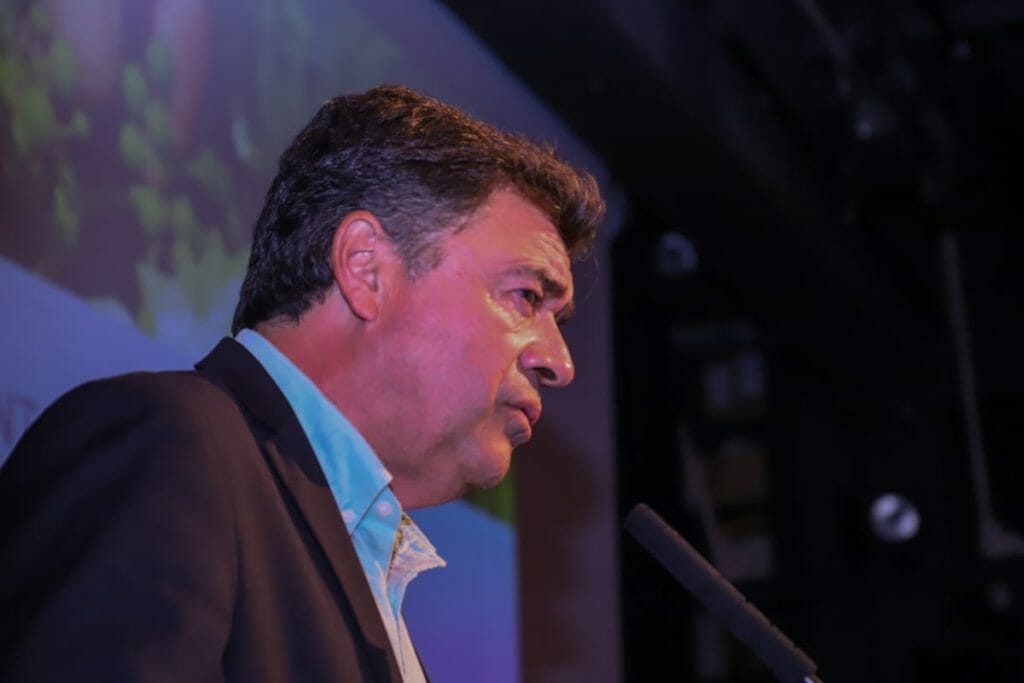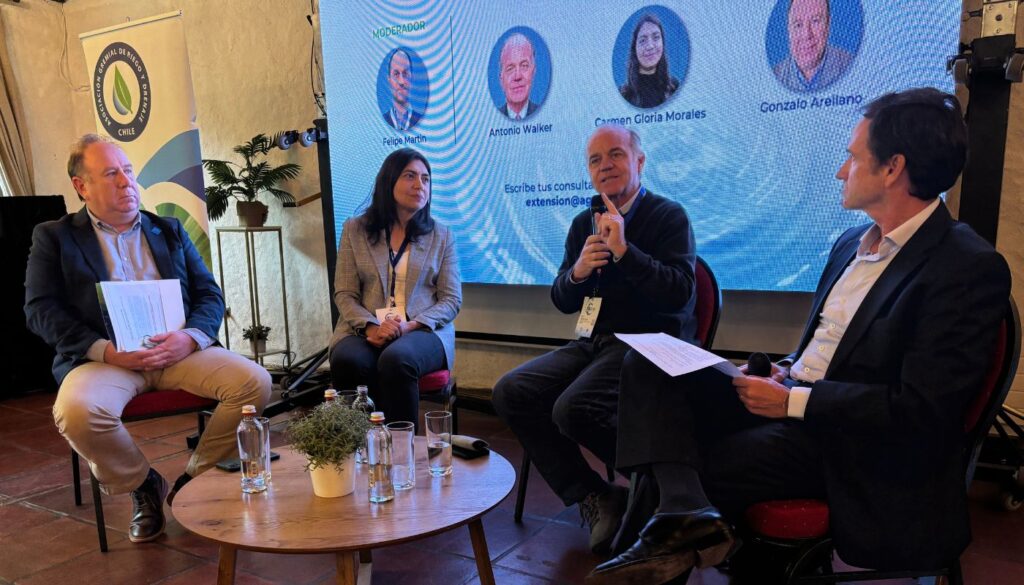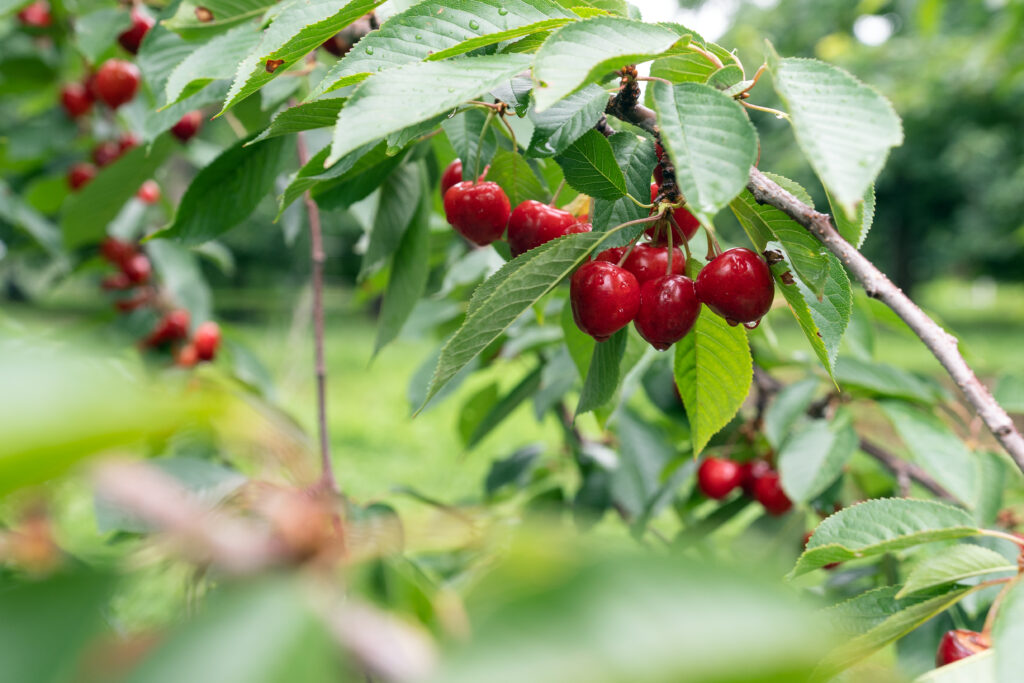
The Secretary of State highlighted the investment of $258 billion of the sowing for Chile plan to support food production in the face of the water emergency, the rise in fertilizer prices and the post-pandemic economic recovery. As part of this program, 12 thousand tons of fertilizers and biofertilizers were delivered, benefiting 71 thousand farmers in all regions of the country.
The plan to sow for Chile, the sovereignty strategy for food security “Together we feed Chile” and the substantive progress in the project that modifies and extends the irrigation law were part of the assessment made yesterday by the Minister of Agriculture, Esteban Valenzuela during the Participatory Public Account 2022-23.
At the ceremony held at the Los Andes Compensation Fund Theater, the Secretary of State, together with the Undersecretary of Agriculture, Ignacia Fernández, gave an account for about an hour and a half of the main advances and challenges of agriculture during the last year.
First, Minister Valenzuela, who traveled to all regions of the country and held more than 600 meetings with the agricultural and forestry-agricultural family, highlighted the implementation of the Siembra por Chile program, which involved an investment of $258 billion, distributed in 13 measures that benefited more than 176 thousand peasants.
This program aimed to support food production in the face of the water emergency, the rise in fertilizer prices, and the post-pandemic economic recovery. Among the highlighted measures of this program is the emergency due to water deficit in a large part of the country and the large-scale Native Forest restoration program, which included the collection of seeds and strengthening of nurseries, which generated 36 thousand jobs and managed to intervene in more than 16 thousand hectares.
As part of Siembra por Chile, 12 thousand tons of fertilizers and biofertilizers were also delivered, benefiting 71 thousand farmers in all regions of the country. They also highlighted the productive reactivation of traditional crops, the tools for financing the sector and transparency indicators such as the Best Seasonal Foods (MAT) indicator.

Food Security Sovereignty Strategy
Access to healthy food was one of the pillars of this public account. In this regard, Minister Valenzuela highlighted the sovereignty strategy for food security “Juntos alimentamos Chile” (Together we feed Chile) presented last week, which guides the State's actions towards strengthening our food system, in order to safeguard the human right to food.
This strategy considers measures to strengthen the assets of the food system through three-year implementation and monitoring plans, for example, with a traditional crop program, the bio-input center, micro-food banks, or the open-air market law.
Emergencies
Dealing with the wildfire season was one of the hardest tasks of the past year. Climate change, low humidity, intentionality and high temperatures were part of the conditions that led to the fires, which consumed nearly 430 thousand hectares in the south-central part of the country.
Following the forest fires, Minister Valenzuela explained that up to $37 billion pesos were made available for the recovery of agriculture, including the delivery of animal feed, irrigation tenders and direct transfers of resources. To date, we have already delivered more than $16 billion pesos, benefiting more than 11 thousand affected small producers.
Another emergency addressed during the ceremony was the spread of avian influenza. Authorities highlighted the information campaigns carried out together with the Ministry of Health and the increase in biosecurity measures in production facilities. In this regard, the head of the agricultural sector praised the extraordinary effort of more than 16 billion in control and various emergency actions for the recovery of the sector.
On the other hand, the Secretary of State highlighted the injection of nearly $2 billion to deal with the emergency caused by the strawberry nematode and the reinforcement of the fruit fly campaign, with more than $5 billion.
Legislative balance
In legislative matters, the Minister of State highlighted the approval of the Beekeeping Law and the Law on the new SAG staff. He also stressed the importance of the new Law on Irrigation Promotion, which was approved unanimously in the Senate and is in its final legislative process.
With the new irrigation law, public support can be more focused on small and medium-sized agriculture, water user organizations, and indigenous and agricultural communities. Valenzuela also stressed that, for next year, the CNR will go from $9 billion pesos to $18 billion, thus doubling the resources.
For this year, the head of the agricultural sector said that the draft Law on the System of Incentives for Sustainable Soil Management (SIGESS) will be presented, which will transform the current soil program. At the same time, he stated that a draft Law on Forest and Rural Fires will be introduced, with the aim of having the tools to effectively prevent, mitigate, control and extinguish these fires that bring more devastation to our territory every year.
He also said that before the end of the year, the bill on the subdivision of agricultural land is expected to be introduced so that rural rustic lands can be used for forestry, agriculture and livestock farming as currently provided for in the legislation, and that they are not subdivisions to establish mere housing plots.
He also praised the project to create the Biodiversity and Protected Areas Service (SBAP), which seeks to establish a public service dependent on the Ministry of the Environment, responsible for the conservation of biodiversity. He also highlighted the proposal to officially create 162,500 new hectares for the biodiversity of our country, including the creation of the new flowering desert national park, Salar Del Huasco National Park and the Santiago Glaciers National Park.

Security and productivity
Promoting international cooperation and boosting national production and export of healthy foods was the key point highlighted by Minister Valenzuela in terms of security and productivity.
In this regard, the authority highlighted the organization of the first Ministerial Conference on Low-Emission Food Systems, addressing the challenge of reducing methane in agriculture, which was attended by more than 20 countries.
He also explained that we will begin the Transition towards sustainable agriculture through an INDAP program to increase the proportion of producers served who develop agricultural systems based on sustainable management and production practices. The program will serve 1,160 farmers, with a total budget of $1,966,550 million pesos.
Rural development
In terms of rural development, the Secretary of State highlighted the preparation of Regional Rural Development Plans that will promote spaces for regional public investment coordination. He also highlighted the reactivation of regional rural women's roundtables throughout the country and the campaign against gender violence and the implementation of irrigation competitions exclusively for them.
Regarding the commitment to indigenous peoples, he highlighted the increase in coverage of the Indigenous Territorial Development Program (PDTI) of the Agricultural Development Institute, adding 2,500 new farmers to strengthen the good living of rural territories.
Finally, he praised the design of the National Rural Digital Connectivity Plan to address the access gaps in rural connectivity, which is expected to be launched in conjunction with INDAP in a first pilot for the Ñuble region.










